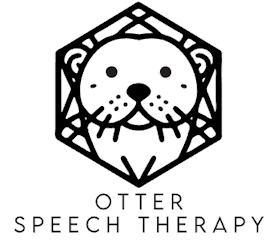Language Delays and Disorders
Augmentative & Assistive Communication (AAC) methods a child can communicate using non-verbal methods (e.g., pictures, AAC device) This type of communication can help supplement or compensate for disordered speech and language. I am additionally trained in Level 1 Picture Exchange Communication System (PECS).
Expressive Language (i.e., use of language) describes a child’s ability to express thoughts and feelings clearly through words, signs and/or symbols, and gestures. Children with expressive language difficulties may struggle with finding the correct words, grammatically correct sentences, specific vocabulary, organizing thoughts in a logical manner, and expressing complicated ideas.
Receptive Language (i.e., understanding of language) how a child understands and uses information. Children with receptive language difficulties may struggle with following directions, understanding information presented, vocabulary, and understanding questions.
Gestalt Language Processors describes children who learn language through usage of whole “chunks” of language. Expression is characterized by frequent echolalia or scripting (i.e., repeating chunks of language heard from people, movies, or TV). This communication style has distinct milestones and requires a unique therapeutic approach to facilitate language growth. I am a Natural Language Acquisition Certified Level 3 Therapist which is the recommended method of intervention for kids who exhibit echolalia.
Speech Sound Delays & Disorders
Articulation child’s ability to correctly produce speech sounds.
Phonology errors with patterns of sounds that persist longer than developmentally appropriate.
Fluency
Fluency Disorders a disruption in the flow of speech characterized by sound and word repetitions, prolongations, or blocks. Children may additionally have muscle tension, speaking avoidance, and secondary behaviors.
Literacy
Phonological Awareness foundational skills needed to read and write. This is the ability to break apart, recognize, and manipulate words, syllables, and sounds in spoken words.
Reading child has trouble reading words or understanding what they read. I am trained in the IMSE Orton-Gillingham Plus (OG+) Curriculum designed to teach children the foundational phonics skills required to be successful readers. The Orton-Gillingham method is considered the gold-standard intervention for any struggling reader or child with dyslexia. I will be fully trained in the IMSE Morphology Plus (Morphology+) curriculum in May, 2025. This training is designed to improve reading comprehension and vocabulary for struggling readers or children with dyslexia.
Writing difficulties with organization of writing such as summarizing and staying on topic. Difficulties with sentence structure, mechanics of writing, complexity of sentences, and writing complete sentences.
Executive Function & Social-Emotional
Executive Functions encompass skills such as task initiation, problem-solving, organization, emotional regulation, flexibility, working memory, and time management. Difficulty with these skills leads to challenges with behavior, peer conflict, and friendships. I utilize curriculums such as Unstuck and On Target! in order to support growth leading to improved executive function skills. Because of my school-based experience, parents can receive support regarding evidence-based strategies to improve social-emotional skills in home environments through the usage of social stories, visual supports, and positive behavioral supports.
Social Communication abilities such as advocacy, perspective taking, conversational skills, and understanding figurative language. I utilize curriculums such as We Thinkers! while also teaching a variety of social thinking concepts to promote growth in this area.
Oral Motor Difficulties
Orofacial Myofunctional Disorders are patterns involving oral and oral musculature that interfere with normal growth, development, or function of the mouth structures necessary for correct speech and swallowing. More commonly referred to as “tongue thrust” therapy.
Julia is trained in and utilizes the following programs:
“Thumbs Up!” Simon Says speech program – used to eliminate thumb or finger-sucking. Prolonged use of thumb-sucking, sippy cups, etc. can negatively affect the positioning of the teeth, swallow, tongue positioning at rest, etc. For use with children aged 4 years old and above.
“Tiny Tongue Tips” Simon Says speech program – used to retrain and strengthen muscles of the face and tongue in order to help develop a correct swallow and speech sound production. For use with children aged 3-7 years old.
“Tongue Tips” Simon Says speech program – used to retrain and strengthen muscles of the face and tongue in order to help develop a correct swallow and speech sound production. For use with children aged 7-8 years old and above.
